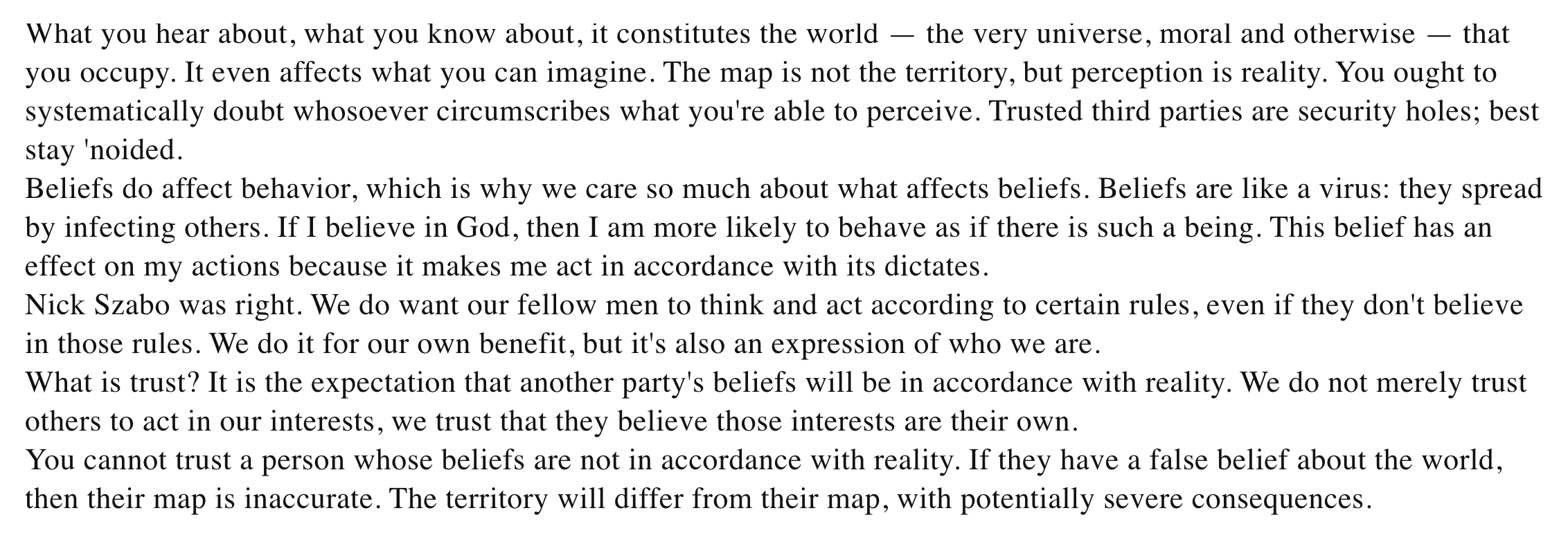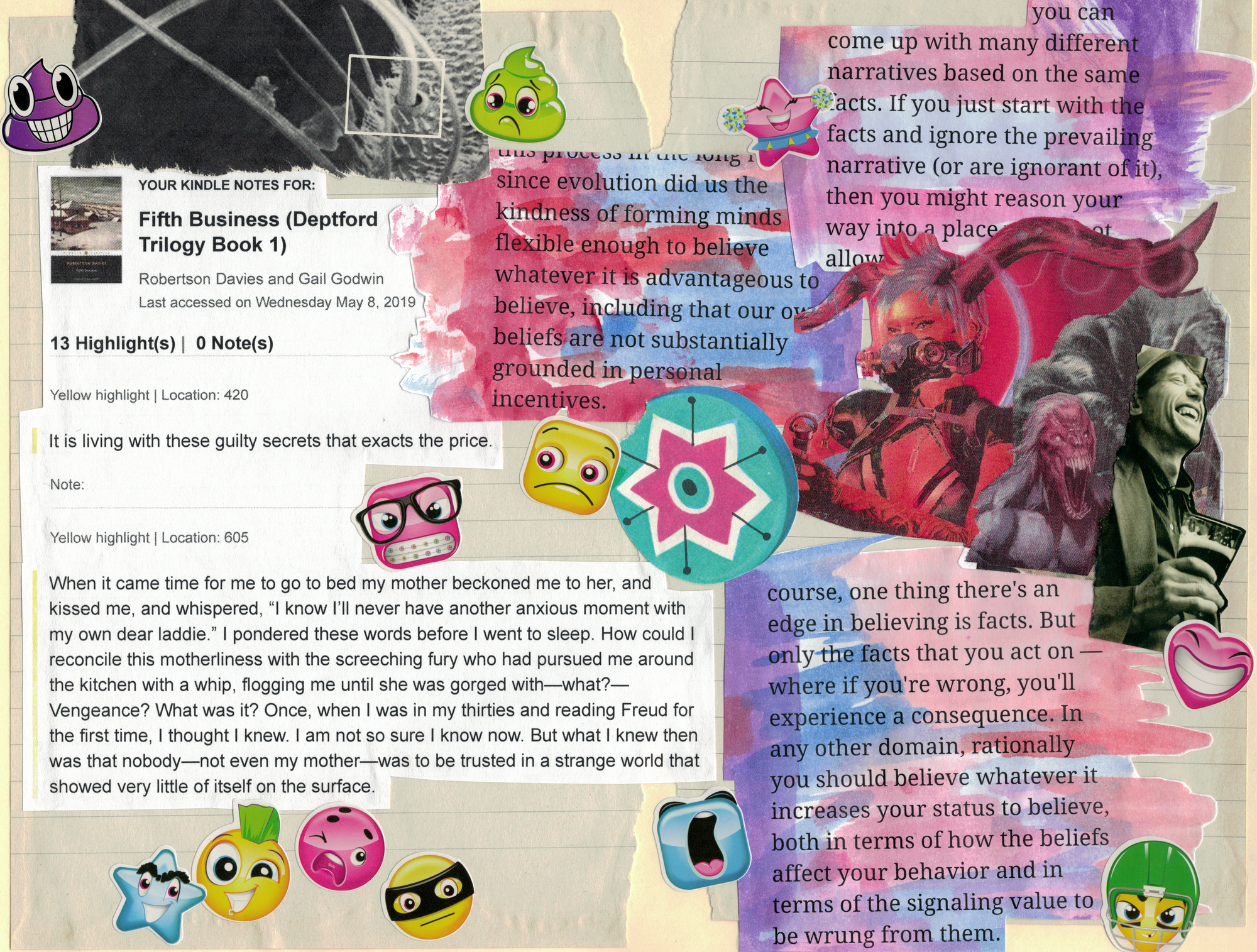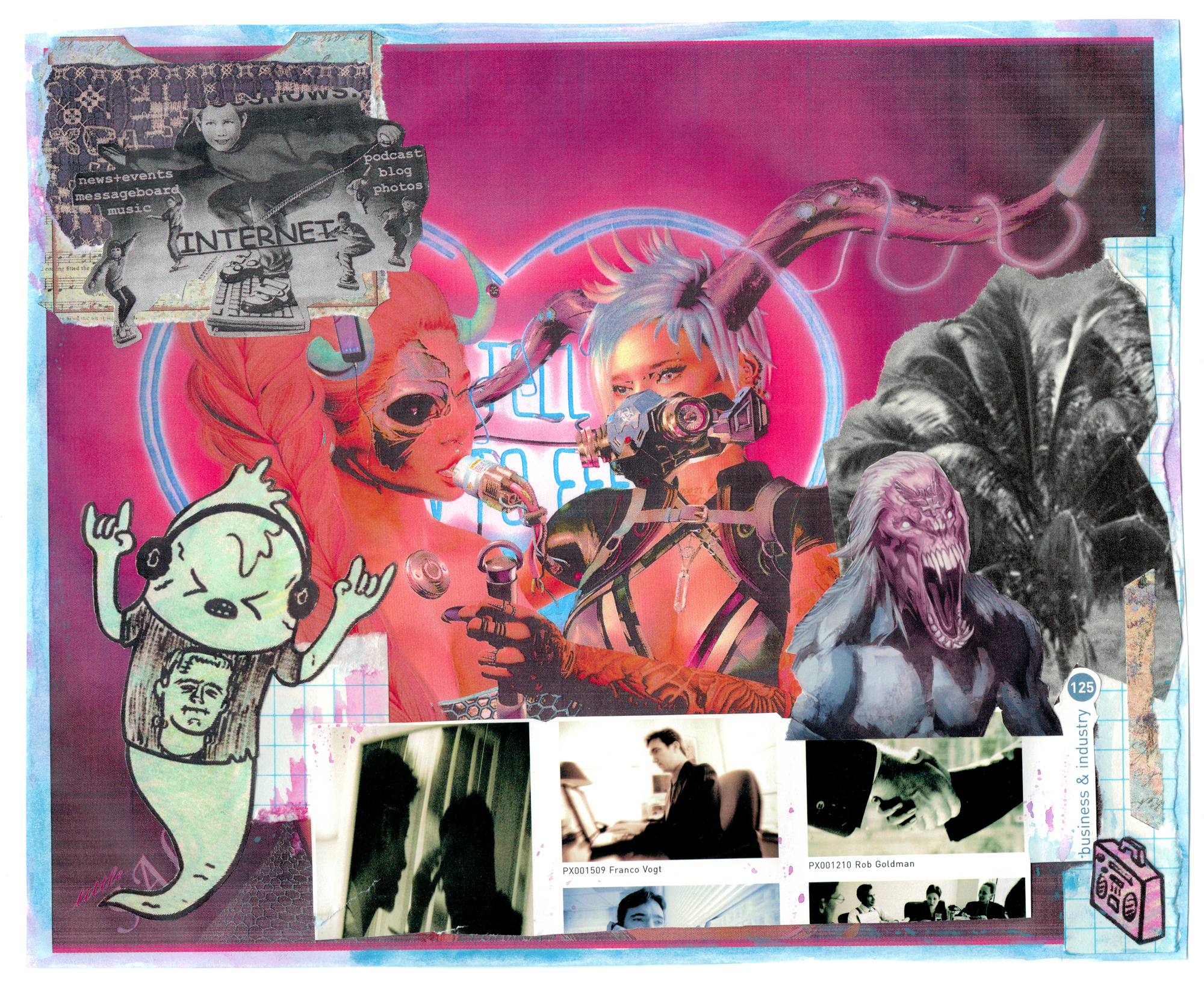My friend Beau suggested that I reflect on cyberpunk again, do an issue of Exolymph for old time's sake. I've been pondering the prompt for a while now.
The internet changed everything, that much is clear. Software changed everything. Computers changed everything — computing changed everything. All beyond obvious today.
Literally today, as the preeminent Big Tech CEOs run the Congressional gauntlet. Perfect timing to bolster my rhetoric! Thanks, society 😏
I will venture to claim that I got this part right in particular:
Economic upheaval always has profound cultural effects. Cyberpunk highlights the power of vigilante hackers, sure, but it also points to the power of institutions, whether stultified or moving fast and breaking things. The balance between these two types of entities is what's fascinating and crucial to watch.
Now that I've almost finished this "essay" — the one that you just started reading — I'm back here in the introduction to flesh it out and clean it up. Neat how I can time travel to talk to you, right?
In earlier drafts I didn't quite realize that I was responding to Alice's most recent piece.
once the new narrative is secure in its hold on society, it projects itself forward in time, constraining the actions of adherents to fit within its prescribed bounds, but also backward, serving to explain events that occurred before it even existed. and because it establishes the axioms by which one constructs reality, it takes enormous effort to see past them.
Keep that in mind. But more broadly — well, Alice covers enormous ground in "alien intelligences." Incidentally, she's the rare writer whose typographic affections I find charming. Form wedded to function, style to substance; medium and message inextricable... Infomorphology all the way down — the shape of anything revealing its environment and the forces to which it has been subject.
it's the incentives stupid
— 🎀 sonyasupposedly.com 🤖 (@sonyasupposedly) July 13, 2020
I think that Alice's overarching theme is volition.
metamorphosis is less well known, a novella-length post-singularity story originally published on a message board. a lot of the content is edgy for the sake of it, and the final chapter is atrocious, not least because unlike the parade of horribles that opens the story, here the author demands your approval. but it paints a fascinating picture of a fully realized digital world. bizarre hobbies and depraved fetishes become the primary focus of the lives of many, taken to dizzying extremes because encouragement and community can come from a pool of billions. social consciousness bifurcates between those who cannot cope with the rate of change and cling to the old ways long after their irrelevance, and those who can feel society crumbling, mutating into some impossible creature, and whether they despise it or revel in it, they at least know what the score is. the quintessential story of the internet
I was offended on my first read the author made the destruction of prime intellect the ultimate point, erasing the world he'd built with all its unexplored vastness while harping on the dangers of technology and civilization. some time later I took the main character's decision to destroy it as basically correct, becoming more sympathetic to the theme of the work, that the goreporn was anodyne compared to the horror of living in a universe without anything to strive for. but now I think I just desire change more than anything. living in a world without prime intellect, I would want to build it; living in a world with it, I would want to destroy it. this strikes me as a perfectly natural way to feel. its creation opens the infinitude of possibility, while its existence precludes it
society prefers to keep people in institutions, shifting them from bubble to bubble as necessary along certain well-defined pathways. the standard track of school to college to career, we've taken to just calling "the pipeline." it is traditionally the most highly curated existence our society provides, promising to shield its participants from hardship and uncertainty as best it can in exchange for unwavering service
replace "college" with any training/credentialing arrangement that led to a forty some odd year career terminating with a funded retirement and this was the standard package on offer in the us since world war ii. it was never quite so solid for black americans, but it started to fail the working class across the board around the late 70s. by the 00s not even a bachelor's degree was good enough to secure that golden ticket. the discourse around stem education and the proliferation of coding bootcamps is driven by a mistaken hope that these parts of the pipeline are built out of solider stuff than the liberal arts track that is by now obviously dead. mass politics, mainstream and radical alike, is presently dominated by this feeling that the people held up their end of the bargain, they pledged their loyalty and their lives, but the security promised to them was a lie
of course society as a whole isn't just the one path. school is the compulsory entrypoint to the system, and most people are shuffled from institution to institution, living inside their whole lives. those who leak out in rare cases may become great successes "despite" this; more typically they are punished mercilessly for their failure to adhere. but now the system is breaking down, every linkage becoming lossier and every component more inhuman, the "good" ones failing their missions and the "bad" escalating their abuses
However, institutionally mediated existence is not the only option.
every culture that has passed through its wild phase has stories of the lone wanderer who survives on his strength and skill alone. the knight errant, the youxia, the ronin. the gaucho, the cowboy. this archetype is so regular you can swap the stories between settings without changing anything else. most people would never choose to live outside their era's protective aegis whatever form it may take. but the romance of doing so is near universal
there are many who sing elegies for exit, convinced they would turn their backs on the world, but alas the option is closed forevermore. "o, to have been born in a time of possibility!" this kind of excuse-making is truly timeless. if possibility does not exist, we must create it. there's simply no other choice to make
I still believe in the frontier. I still believe in freedom
So do I. Hence reality is the litmus test; achievement is the only worthy judge. But a dilemma remains. Which obstacles are surmountable, and which are not, and when, and why, God, why?
In addition to being fractal, reality is specific. There is simply no substitute for making the exact right call at the exact right time.

In each case, the fundamental principle is that the hacker asks: "here I have a system W, which pretends to be made out of a few Xs; however, it is really made out of many Y, which form an entirely different system, Z; I will now proceed to ignore the X and understand how Z works, so I may use the Y to thereby change W however I like".
if I were an atheist, I would make some argument about the purpose of life being to beget life, that we are an aberration of complexity in an otherwise undifferentiated patch of spacetime, that entropy is the worldeater and the highest calling is to defy it and proliferate and fill the galaxy with minds. if I were a christian, I would claim that the lord made us in his image to the point of endowing us with the power of creation, that the culmination of theosis is to experience the act of forming and tending to life in turn, that the most christlike existence is that of the shepherd. but I believe in the designs of fate and the will of man. if it is possible and it is desired and it is pursued, it will happen
If something is technically possible and might conceivably offer an edge — no guarantee necessary — someone will eventually do it. Furthermore, enough someones will get the idea in their heads that the thing will be repeated until common knowledge develops about whether or not it offers an edge.
If it does, everybody will start doing the thing, thus obviating the edge. Unless there is a reliable constraint on people's ability to do the thing. In practice, there often are such constraints, though not necessarily placed where we'd like them to be, and rarely comprehensive.
Either way, if the thing offers an edge, in the absence of a stronger countervailing incentive, the thing will happen. To be more precise, whichever parties are not counter-incented will benefit from the edge.
Principles do little to impede this process in the long run, since evolution did us the kindness of forming minds flexible enough to believe whatever it is advantageous to believe, including that our own beliefs are not substantially grounded in personal incentives.
I wonder if the urge to synchronize other people's opinions with yours is the same that lets dominant thoughts in your own mind subdue and harmonize your other thoughts.
— Joscha Bach (@Plinz) June 4, 2020
There are exceptions, of course — the rare, precious sort of person who will earnestly explain to Stalin that no, look, the math is wrong. How has that type managed to persist? You can't conceive of a stable niche for brilliant people too oblivious to be corrupted by their own skin in the game?
No regime can actually kill them all, not every last one, and the societies that allow maximally-decoupling-but-otherwise-harmless nerds to flourish will benefit from their eventual largesse. (I gotta say, though, surely this wouldn't be such a problem if we had fifty Stalins!)
The same competitive pressures apply to ideas, to beliefs, that do to behaviors. If there's an edge in believing something, people will convert as soon as that becomes apparent. It's not insincerity, it's instinct.
I perceive opinions on twitter increasingly from an ecological perspective. If an opinion is possible, it will find someone to champion it. If it aligns with opinion having incentives, it's going to be abundant. I mostly don't think: oh, you're wrong! but ah, there you are!
— Joscha Bach (@Plinz) July 21, 2020
Granted, there is a well-established edge in believing facts. But only those facts which you act upon; only in those circumstances where if you bet wrong, you'll experience a consequence. In any other domain, rationally you should believe whatever it is most advantageous to believe, both in terms of how the beliefs affect your behavior and in terms of the signaling value to be wrung from them.
A lot people seem to see the main value of social interaction in participating in some kind of hivemind. Most hiveminds maintain coherence by limiting the range of acceptable opinions. The folks playing this game don't perceive the fully autonomous part as the human part.
— Joscha Bach (@Plinz) July 22, 2020
what convinces people? IMO, a twist on my universalization of Sailer's Law. people are convinced by the following subconscious realization: "if we all coordinate on this cultural narrative [if we all buy into this memeplex; become part of this egregore], my status will go up"
— 🎀 sonyasupposedly.com 🤖 (@sonyasupposedly) July 7, 2020
Someone who perfectly calibrates which of their beliefs to base on facts versus fashion can be expected to outcompete someone else who tries to use facts as the basis for every belief. After all, various different narratives will fit the same set of facts.
If you start with the facts and ignore the prevailing narrative, or are ignorant of it, then you might reason your way into a place where you're not allowed to go. Mustn't do that.


Psychosis means generating your own simulacra; sprouting stand-alone complexes spontaneously. Imagine your cognition itself become cancerous, concepts and characters redoubling without restraint into grotesque disfigurements of the mind.
Describing an unhinged man he encountered at work, Dormin summed it up:
That thirty minute phone call was terrifying. I wasn't actually scared of being murdered, and we never gave in to his demands, but it wasn't until that call that I understood what it meant to be crazy. It unnerved me in a sort of staring into the abyss way. This man was truly detached from reality. He either didn't know or could not understand the facts before him. When presented with reality, he would lash out in pain and anguish and fury at phantom targets. I would make calm, reasonable arguments about how he had violated his work contract, hurt our business, hurt our clients, and lied to us, and he would respond with nonsensical excuses, random tangents, blaming his personal life, and never ever coming close to acknowledging his own culpability.
I came away from the conversation with a mixture of pity, revulsion, and dread. I don't know if this guy was bipolar, drug-addled, schizophrenic, or what, but I was 100% sure that this man lived in a nightmare. Everything was confusing and nonsensical to him. The world was dark, malevolent, and couldn't stop hurting him even as he tried his best. I had an imagine of him sitting alone in his tiny apartment listening to that one student's song over-and-over again on repeat while his mind blurred between random scientific and historical topics until he could no longer fight the urge to pick up the phone and call me or someone like me who took enough pity on him to politely listen for a few minutes until we made excuses and left him back alone in silence.
Cacophony and isolation — the concurrent life sentences of the truly mad.
Why do I bring this up? Multiplayer psychosis, that's why. Psychosis as described above; multiplayer because we're all in here together, logged on and losing our minds. It's my term for "the discourse."
twitter is the worlds greatest mmo
— Public Universal Nuisance (@eigenrobot) July 22, 2020
"the news" is a distributed multiplayer PVP reality show, which the people on top desperately keep trying to script as a prestige drama
— 🎀 sonyasupposedly.com 🤖 (@sonyasupposedly) July 25, 2020
[narrator voive] in a world... without substance..... style.... BECOMES substance
— 🎀 sonyasupposedly.com 🤖 (@sonyasupposedly) July 25, 2020
sufficiently advanced posturing is indistinguishable from insight
— 🎀 sonyasupposedly.com 🤖 (@sonyasupposedly) July 25, 2020
Basically, every day there are headlines, and the various cliques comment on them — sometimes the same stories, with a lot of sniping back and forth. Sometimes different ones, in which case there's still a lot of sniping back and forth. This chatter comprises a plausibly deniable veneer over the Internet of Beefs. "Meatspace is just a source of matériel to be deployed online," as Venkat put it. Helldump go brrr.
Each day on twitter there is one main character. The goal is to never be it
— maple cocaine (@maplecocaine) January 3, 2019
Voyeurs one and all, we encircle the ill-fated protagonist — of "The Lottery," naturally — slavering for the next sacrifice. Our whetted appetites on display, obscene like a vulture's knobby red head.

How'd we get here? Easy-peasy, it was the inevitable consequence of computers.
"Disseminating arbitrary text is now trivial for virtually anyone in the first world, and for nearly half of people on the planet," Alice pointed out (originally in 2017). "Entire industries are in a state of collapse over this, great institutions that formed around the tools of the industrial age now in the process of unwinding."
Friction (lack thereof), Moloch (sacrifices, remember?), Cthulhu (ultimate devourer of cultists), etc., so on and so forth.
“Accelerationism” “Actor-Networks” “Ahumanism” “Cthulucene” “Fanged Noumena” “Hauntology” “Hyperobjects” “[Adjective] Materialism” “Metamodernism” “Neorationalism” “Numogram” “OOO” “Post-capitalism” “Rhizomatics” “Technocapital” “Templexity” “Theory-fiction” pic.twitter.com/SFLS8w3QDM
— Gregory Marks (@thewastedworld) July 26, 2020
Gnon put the selection pressures in a box. "There," he said. "Now we will live in the Dream Time."
— Adam Strandberg (@The_Lagrangian) November 18, 2018
"But we can open the box," said Moloch.
"That is true," said Gnon.
More recently, and less obliquely, L.M. Sacasas: "The advent of digital media has been to the culture wars what the advent of industrialized weaponry was to conventional warfare."
Digital media has dramatically enhanced the speed, scale, and power of the tools by which the culture wars are waged and thus transformed their norms, tactics, strategies, psychology, and consequences.
Culture war skirmishes now unfold at a moments notice. The lines of battle form quickly on social media platforms. Tens of thousands of participants, not all of them human, are mobilized and deployed to the front. They work at scale, often in coordinated actions against certain individuals, working chiefly to discredit and discomfit, but also to confuse, incite, exhaust, demoralize. The older, perhaps always idealistic aims of persuasion and refutation are no longer adequate to the new situation. Moreover, skirmishes that become pitched battles spill out indefinitely, becoming black holes of attention, which become massive drains of resources and energy.
Along these lines we can see that the power of digital media lies in their immediacy and scale, but also in their ability to widen the war. Direct mail may have targeted you, but social media involves you directly in the action. Take up your memes, comrades. We are no longer mere spectators of battles waged for our allegiance by elite warriors of the political and intellectual classes. In the digitized front, we are all armed and urged to join the fray. The elites themselves quickly become the victims of the very cultural warfare they had once stoked to their advantage.
thinking of inventing a new type of person to get mad at on here. maybe people who carry too many keys around.. i dont know yet
— wint (@dril) August 30, 2018
Twitter is 50% people inventing guys to get mad at and 50% people inventing women to fall in love with them https://t.co/uodydLxkgd
— Ry (@spinereader) July 11, 2020


the weird part is when the traces we take from the image of them into real life almost makes them actual
— pyres (@nonchalantly_) July 11, 2020
Why do we care so much about each other's opinions in the first place? Why should I give a fuck what you think?
You know why. It's because you might vote, or you might buy something. Meanwhile I have to live in a goddam society alongside you.
Power lies in directing the votes and the purchases. (In this context, even a donation can be considered a purchase.) Contemporary representative democracy produces politics as the business of cajoling people into ceding their decisions. It's only natural for culture to be critical to the whole enterprise.
groups of people will naturally craft stories to understand their world, to explain it as it is and how it came to be. circumstance decides whether the salient group at some time and place is a ruling class or a culture at large. but whether one or the other, they see through the lens of their narrative, teach it, enforce it, and it comes to serve as their shared basis of reality. this grounds their understanding not only of the world, but of other group members. they can expect each other to act in accord with this basis, can expect others to expect them to, and so on. this never needs to be stated, it is felt innately. it is just how things are
Manufacturing consent? Sure, but if it don't come easy, why not manufacture obeisance? How big of a difference is there really?
Think about it — the easiest, most effective method of control is directing people's attention. Bro, you don't even have to lie, just be selective about what you show! The lying is a perk 😜
"In order to conduct a propaganda there must be some barrier between the public and the event," Walter Lippmann observed in Public Opinion. "Access to the real environment must be limited, before anyone can create a pseudo-environment that he thinks wise or desirable. For while people who have direct access can misconceive what they see, no one else can decide how they shall misconceive it, unless he can decide where they shall look, and at what."
We got ‘em boys. The person responsible for all this. No it wasn’t Xi Jinping, or Trump, or George Floyd, or George Soros. Nope. You were all wrong. It was good old Walter Lippmann, founder of the New Republic magazine. pic.twitter.com/IuzMm4fVaU
— Psywar Planner Kantbot (@KBULTRA0) July 3, 2020
So we lash out to reclaim a feeling of participating in this meaningful public discourse. Of contributing to Public Opinion. But it eludes us, so we angrily bash heads, and get angrier and angrier and try and destroy those who seem to oppose our self-realization thru our opinions
— Psywar Planner Kantbot (@KBULTRA0) July 15, 2020
The problems here have more to do with the nature and need for Public Opinion, how it's generated, the part we play in that, the false notions we have about how this works, and what our role really is, our frustration at not being able to make democracy work via our contributions
— Psywar Planner Kantbot (@KBULTRA0) July 15, 2020
Under Neoliberalism this entire problem has been sidestepped through information control systems, public opinion managements. Worldview has become a product. And it no longer functions as a basis for "life," or for us to harmonize ourselves with the world. But weaponizes us.
— Psywar Planner Kantbot (@KBULTRA0) July 29, 2020
Aggregation Theory applied to ideology. Ain't no marketplace of ideas, rather a battlefield on which egregores run amok.

Beliefs do affect behavior, ergo we care fiercely about whatever may affect beliefs.
Lippmann again: "The way in which the world is imagined determines at any particular moment what men will do. It does not determine what they will achieve. It determines their effort, their feelings, their hopes, not their accomplishments and results."
Nonetheless, he insisted: "The very fact that men theorize at all is proof that their pseudo-environments, their interior representations of the world, are a determining element in thought, feeling, and action."
What you hear about, what you know about, it constitutes the world — the very universe, moral and otherwise — that you occupy. It even affects what you can imagine. The map is not the territory, yet perception is reality.
You ought to systematically doubt whosoever circumscribes what you're able to perceive. Trusted third parties are security holes; best stay 'noided.

Personally I hew to the "expectancy theory" model of decision-making, which is so common-sensical that it sounds like it oughtn't to be a theory. In short, people do whatever they think will yield the best results for them. "Best" is relative to their values and preferences, and assessed against the alternatives that they conceive as practical options.
Accordingly, people can mostly be counted on to follow the obvious incentives. But sometimes they're plain wrong. Either about what their incentives actually are — about what actions or even outcomes would materially further their concrete goals — or about how to achieve the objectives that they sensibly or bafflingly wish to pursue.
assortive matching go brrrr: people who are absolutely terrible at making decisions have an easier time finding each other https://t.co/awdPDgCoRs pic.twitter.com/WIyoxPW1r5
— 🎀 sonyasupposedly.com 🤖 (@sonyasupposedly) July 14, 2020

Let us return to the multiplayer psychosis:
"just stop caring about the culture war lol"
— 🎀 sonyasupposedly.com 🤖 (@sonyasupposedly) July 23, 2020
man I sure wish I could but if it were that easy, none of us would be in this predicament
nature doesn't let you turn off the competitive drives that fuel group conflict
been thinking about this a lot lately. Twitter's protagonist of the day... the plot advancing absurdity by absurdity, everyone excited to bicker about what just happened and what will happen next... we live in a society and that society is an entertainment product https://t.co/RIPWxgRd1M
— 🎀 sonyasupposedly.com 🤖 (@sonyasupposedly) July 28, 2020
there's no conclusion to this... these runaway signaling spirals are like the Red Queen's Race, like advertising leaving every firm worse off in material terms and thus being indispensable
— 🎀 sonyasupposedly.com 🤖 (@sonyasupposedly) July 28, 2020
Culture War yields no conclusive confrontation, only slippery slopes. Factions mutate as the egregores evolve to fit the times.
Form wedded to function, style to substance; medium and message inextricable... Infomorphology all the way down — the shape of anything revealing its environment and the forces to which it has been subject.
But maybe... a takeaway? An action item? Some hot tips? Or... hot singles near you, act now while supplies last?
misunderstandings between people, disagreements between living cultures, misreadings of past societies that seem object-level but actually cut to the heart of inarticulable axioms. the uncanny valley of belief. the opposing stances that the united states and china take on freedom of expression and intellectual property are grounded in feelings about whether the individual or the society should have primacy. from a certain perspective, our copyright is unjust censorship and our unfettered speech is dangerously destabilizing.
I'll drag out Walter Lippmann again:
The opponent has always to be explained, and the last explanation that we ever look for is that he sees a different set of facts. Such an explanation we avoid, because it saps the very foundation of our own assurance that we have seen life steadily and seen it whole. It is only when we are in the habit of recognizing our opinions as a partial experience seen through our stereotypes that we become truly tolerant of an opponent. Without that habit, we believe in the absolutism of our own vision, and consequently in the treacherous character of all opposition.
And later in the book:
Politics is interesting when there is a fight, or as we say, an issue. And in order to make politics popular, issues have to be found, even when in truth and justice, there are none, — none, in the sense that the differences of judgment, or principle, or fact, do not call for the enlistment of pugnacity.
Like I said upthread: It's the incentives, stupid. We're all mad here, but not so mad that we can't ask... gosh, cui bono?
it is important to choose one's ideals with care, then embrace them wholeheartedly, good and bad alike, honestly and without illusion. the curious child who disassembles a household gadget to see how it works does so joyfully, with no concern for whether they can put it back together again! investigate with this spirit, or not at all!
In addition to various collage materials that I had on hand, I used the following images to illustrate this essay:
- -12- All Is Full Of Love by Little Salty
- Untitled artwork by giant mice kill rabbits
- Singing songs on the eve of destruction... by I am R.
- Borderline Biennial 10 octobre 2009 - P1010766 by Thierry Ehrmann
- INTERNET by Keenan Pepper
- Frankie Headphones drawn by mumbot
- 17th-century Italian embroidery
- Miniature secretary incorporating a watch by James Cox
- "A very well put insect and beautiful dancer" from Scenes from the Private and Public Life of Animals, J. J. Grandville
- First Dream by J. J. Grandville
- 15th- or 16th-century Incan double bowl
- Miscellaneous Paintings and Calligraphy for the Third Year of the Bunsei Era by Tani Bunchō




